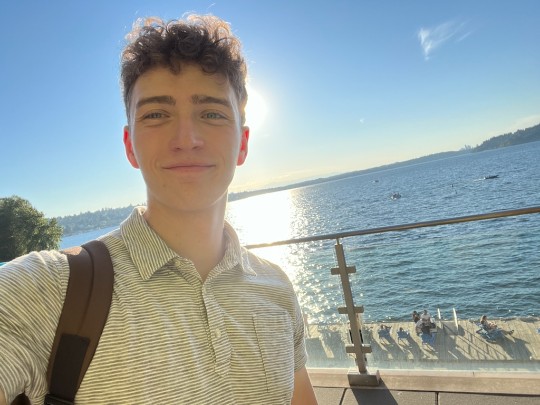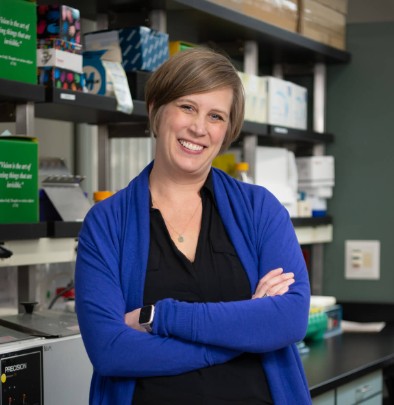The Boeing Classic is More Than a Golf Tournament, It’s a Catalyst for Cures
August 2, 2024
The Benaroya Research Institute at Virginia Mason Franciscan Health is a beneficiary of the Boeing Classic
For 19 years, PGA Tour Champions have made the trek to the Pacific Northwest to compete in a golf tournament unlike any other. At one of the most picturesque golf courses in Washington, the Boeing Classic brings together thousands of golf enthusiasts and spectators to the Club at Snoqualmie Ridge to enjoy a weekend of premier golf and family-friendly activities. The Boeing Classic is more than a golf tournament; it’s a catalyst for life-changing research.
The beneficiary of the tournament is Benaroya Research Institute (BRI) at Virginia Mason Franciscan Health. To date, the Boeing Classic has raised more than $9 million for local charities, including BRI, a world leader in human immunology. BRI’s mission is to advance the science to predict, prevent, reverse, and cure diseases of the immune system. At BRI, groundbreaking research is currently underway studying diseases that affect it—including type 1 diabetes, multiple sclerosis, rheumatoid arthritis, allergies, asthma, cancer, and COVID-19.
Zane Burris, 21, knew he would develop type 1 diabetes from a very young age. According to the American Diabetes Association, about 2 million adults in the U.S. have type 1 diabetes.
“For me, it was never a question of if I would develop type 1 diabetes. It was when,” he said.
“My mom found out I had markers for type 1 diabetes when I was a newborn through participating in a study called DAISY,” he continued. “She figured it would help science and couldn’t hurt to know if I might develop type 1 diabetes. To her surprise, I had two markers, which meant I would almost certainly develop type 1 diabetes at some point.”

“A simple blood test can detect these autoantibodies,” Dr. Cate Speake, associate member and scientific director of the BRI Center for Interventional Immunology. “Our question is how to integrate this test into primary care so it's as easy as possible for patients and providers.”
This type of screening can provide vital health information: If people know they are on track to develop an autoimmune disease like type 1 diabetes or Rheumatoid Arthritis (RA), they can watch for early warning signs.
As a nonprofit research institute within VMFH, BRI collaborates with doctors and patients at VMFH to accelerate the path from innovative lab discoveries to life-changing patient care.
“In type 1 diabetes, recognizing the early warning signs can help avoid a life-threatening complication called diabetic ketoacidosis (DKA),” Speake said. “Knowing you’re on track to develop diseases like RA can open the door to earlier treatment, which can mean less severe symptoms and potential long-term health benefits.”
That knowledge spurred Burris to make lifestyle changes, and when he moved to Seattle from Colorado, he was connected with BRI. He participated in a study testing a medicine aimed to delay the onset of type 1 diabetes.
“I believe that research is very important. If I can help BRI by participating in research—if I get to be one tiny footnote in the cure for diabetes—then that’s pretty incredible,” Burris said.
For young adults like Burris, support for the research means the world.

“With this kind of diagnosis, it’s not like life just stops and says, ‘Okay, let’s give Zane a minute to figure this out.’ You just have to add it onto everything you’re already dealing with. That’s why I’ve been so grateful for BRI’s team and all the help they’ve given me.”
One day, the hope is people like Burris will have a cure thanks to the research being done at BRI, and that supporters like the Boeing Classic may have a footnote in that discovery as well.
“Philanthropy plays a crucial role in BRI’s work: It allows us to test innovative ideas. It helps us bring scientists and bioinformaticians together to tackle challenges using the latest in immunology and data science,” said Dr. Jane Buckner, president of BRI. “We are so grateful for Boeing, the Seattle Seahawks, the PGA Tour, and all of the community members who support the Boeing Classic. Your support brings us closer to achieving our vision of a healthy immune system for everyone.”
About the Boeing Classic
The Boeing Classic, a PGA TOUR Champions event, was founded in 2005 by Virginia Mason Franciscan Health and the Seattle Seahawks. The beneficiary of the tournament is the Benaroya Research Institute (BRI) at Virginia Mason Franciscan Health. This annual event celebrates the researchers and patients who benefit from the advances made possible, in part, by the tournament. It also recognizes the committed partners who contribute to this important cause.
About Benaroya Research Institute (BRI)
As the primary beneficiary of the Boeing Classic, BRI uses the proceeds to advance cutting-edge research to predict, prevent, reverse and cure immune system diseases, like type 1 diabetes (T1D), lupus, multiple sclerosis, cancer, and COVID-19, and applying discoveries made in one disease to improve health for all. BRI recently played a significant role in developing a therapy to delay disease onset, for two years or more, for people at high risk of developing T1D. Now, we can definitively state that detection is feasible – and prevention is possible. BRI is actively working to apply this advancement to other autoimmune diseases. BRI is part of an integrated health system, Virginia Mason Franciscan Health (VMFH), which serves the Pacific Northwest.
About Virginia Mason Franciscan Health
Virginia Mason Franciscan Health (VMFH) is an integrated health system serving the Puget Sound region, including 10 hospitals and 300 care sites. Founded in 1891, VMFH embraces its long history of caring for the most vulnerable, especially the poor and underserved, and meeting the evolving health care needs of the vibrant, diverse communities it serves. VMFH is a proud home to the Bailey-Boushay House, the first skilled nursing and outpatient chronic care management program in the United States designed specifically to meet the needs of people with HIV/AIDS, and the Benaroya Research Institute, an internationally recognized institution for autoimmune disease research. VMFH is part of CommonSpirit, one of the nation’s largest health systems, dedicated to advancing health for all people.
